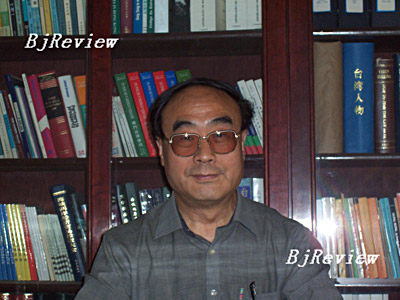
For those involved in the protection of intellectual property rights (IPR) like Li Shunde, a prominent expert in this field, April is the busiest month of the year. Traditionally, the month witnesses a flurry of activity across China surrounding World Intellectual Property Day, which falls on April 26. Li, Deputy Director of the Intellectual Property Center at the Chinese Academy of Social Sciences, was on a tight schedule this April, traveling extensively at home and abroad to give lectures, attend seminars and address commemorative ceremonies. In early May, he sat down with Beijing Review reporter Yan Wei to share his observations and thoughts on this highly charged topic, especially in regard to IPR disputes between China and the United States.
Beijing Review: Michel Danet, Secretary General of the World Customs Organization, indicated in Geneva earlier this year that the Chinese Government had honored its commitments to the World Trade Organization (WTO) for cracking down on piracy. What's your comment on the Chinese Government's efforts in IPR protection?
Li Shunde: I think Danet's comments are quite objective. He gave a positive recognition of China's efforts in IPR protection. As a matter of fact, China has beefed up its IPR protection in recent years, especially since its entry into the WTO. It has achieved universally recognized achievements as it intensifies efforts to fight against counterfeited goods and pirated items.
The United States filed two WTO cases over IPR against China in April, the first cases filed against China over this issue since it joined the world trade body in 2001. How do you view this move?
The cases the United States filed were about two interrelated issues---copyright piracy and the market access of U.S. cultural products. As a WTO member, the United States has the right to file cases to the organization. In fact, China and the United States have consultations on IPR and trade issues at different levels in recent years, including government-to-government consultations and negotiations. The disputes should have been resolved within a bilateral framework. The spokesperson of the concerned department of the Chinese Government has questioned why the United States should refer the issues, which can be settled bilaterally, to the WTO, while expressing regret over this move. Filing the cases to the WTO may not help to solve the problem. Instead, it may make it more complicated, as the two countries will have to put a lot of effort into dealing with the complex WTO dispute settlement procedures.
It should also be noted that the United States could have ulterior motives for filing the cases. It could just want to exert pressure on China. The second China-U.S. Strategic Economic Dialogue will be held in May. In my opinion, the United States filed the cases to the WTO so that it could gain an upper hand in the upcoming negotiations. This is totally unnecessary. The Chinese Government is not afraid of dealing with the issues in the WTO because it has valid justifications.
After the United States filed the cases, the Chinese Government stated its positions at a press conference. I believe the government has adopted a correct attitude. Both the IPR issue and the market access issue can come down to contentions over economic interests. The copyright industry is a pillar industry of the United States. We understand that it is eager to export more copyrighted products to the huge Chinese market. This vision can only be realized if the two countries conduct efficient consultation. Simply pressuring China to open its market for U.S. cultural products will not work. Unlike other goods, copyrighted products are sensitive to every country, as they have a bearing on ideology and culture. No countries, including the United States, will completely open the market for foreign cultural products. Years ago, the international community was shocked when disputes broke out between the United States and France over the latter's restrictions on the import of U.S. movies. As France was firm in developing its own movie industry, the United States failed to do anything about it. The case is evident that exerting pressure is not the way to solve problems.
Disputes over IPR protection have always been a stumbling block hindering the development of China-U.S. economic and trade relations. The disputes have escalated since the second half of last year. What actions can China take to address U.S. concerns?
| 